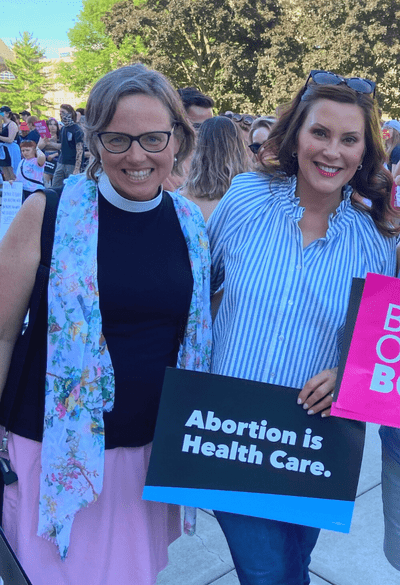In this op-ed, Rev. Alice Fleming Townley addresses why she will be voting yes on Proposal 3, which restores rights lost when Roe v. Wade was overturned by the U.S. Supreme Court, on Election Day here in Michigan.
REV. ALICE FLEMING TOWNLEY
Mission and Justice Coordinator, Michigan Conference
When I was three years old, my family and I were in a serious accident. The driver who ran the stop sign and hit our car died. My mother’s body was crushed by the impact. I remember my beloved mother on a stretcher being lifted into the ambulance, the kind stranger who held me on her lap on the way to the hospital, and the hospitality of cousins who took me to live with them for a season.
As I got older, I learned more. My parents shared that even after emergency surgeries, not even the doctors knew if my mother would live or die. My mother was also pregnant at the time of our accident. A few days later, the baby was stillborn. After that, my mother started to regain strength and recover. My parents reflected with me specifically about that sequence. My dad didn’t know how he could have continued, or raised children, without my mother. They were deeply relieved that they did not have to consciously make such a hard choice. As they talked, and as they paused, I could feel their deep grief and gratitude. I could feel their empathy for all who might be in such circumstances.

I am now a pastor, as were my parents. As a clergywoman, I have the sacred privilege of listening to people’s life stories. Life is not perfect, and there are personal and often difficult circumstances that lead to the choice to end a pregnancy. Recently I have heard interviews with doctors and nurses who face possible criminal penalties for providing medical care now that Roe v. Wade has been overturned. I shudder to think what would have happened if my own mother had been denied surgery in the trauma unit after our accident.
There is a spectrum of beliefs about reproduction within faith communities, and within my own denomination and annual conference. I believe it is neither the imposition of a particular religion nor the government; women themselves should be able to access healthcare and make decisions according to their own intellect, values, and situation.
The United Methodist Church, where I belong, respects both the well-being of the mother and the unborn human life. And “we recognize tragic conflicts of life with life that may justify abortion, and in such cases we support the legal option of abortion under proper medical procedures by certified medical providers” (The Book of Discipline of The United Methodist Church—2016, ¶161, K).
There are a variety of situations with tragic conflicts of life with life. Outlawing abortions will not stop them; rather, as we already see, women of financial means will travel to states where they are safe and legal, while poor, marginalized, working-class women and girls would be left with unsafe procedures that could cost them their lives.
On May 4, 2022, Harriett Jane Olsen, General Secretary and CEO of United Women in Faith, issued the following statement, “We call on federal and state legislators to act to protect the lives of women and girls by codifying their right to privacy, to legal and safe contraceptives, and, in tragic conflicts of life with life, abortions. State-coerced motherhood—like state-coerced sterilization—undermines women’s ability to carefully discern and follow God’s calling in their lives.”
On the day Roe v. Wade was overturned, I went with friends to the State Capitol in Lansing wearing my clerical collar. As a person of faith, I was there to support women like my mother, sister, daughter, and myself and men like my father, husband, and son. I was there to support doctors, nurses, and caregivers. I was there to support those working toward legal and accessible healthcare for all women. The eye of my heart saw the tears. And I heard again and again, “Thank you, minister, for being here.” I was there to be the kind stranger. I was there to be a compassionate presence amid deep loss, anger, and grief.
I am voting yes on Proposal 3 in Michigan. This proposal restores rights lost when Roe v. Wade was overturned. This proposal allows women to access the full range of reproductive healthcare, including prenatal care, childbirth, postpartum care, contraception, sterilization, abortion care, miscarriage management, and infertility care.
When I asked my mother permission to share our family story and what I had learned from both her and my father, she was deeply moved. Speaking from her deep, wise heart, she prayerfully responded, “Please, do. Choice in these matters is so important.” Circumstances beyond our imagining do happen. And when they do, medical care, the kindness of strangers, and space to recover are needed. That is why I am voting yes on Proposal 3.
READ MORE: The United Methodist Church Social Principles statement on abortion.
Last Updated on October 28, 2022

